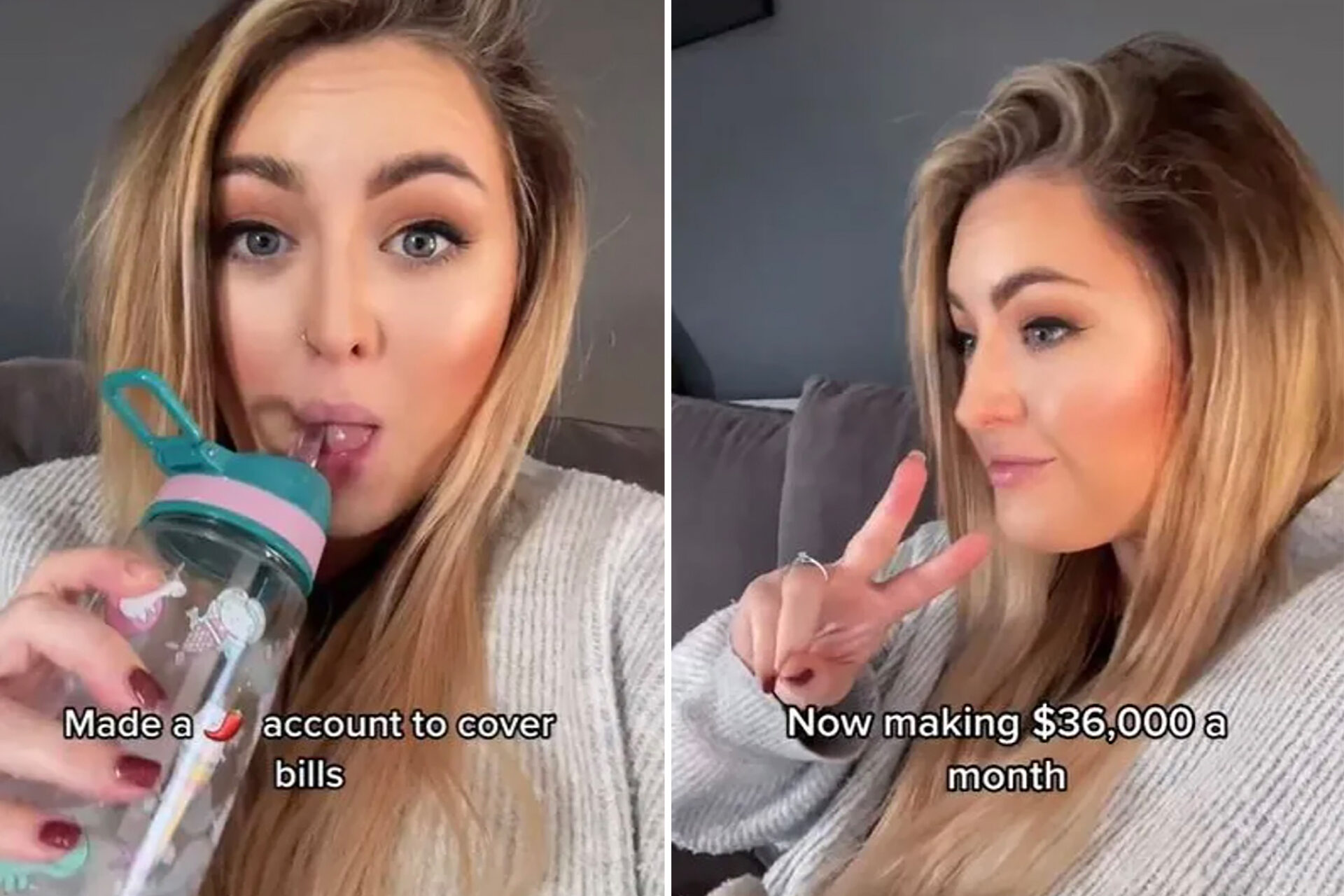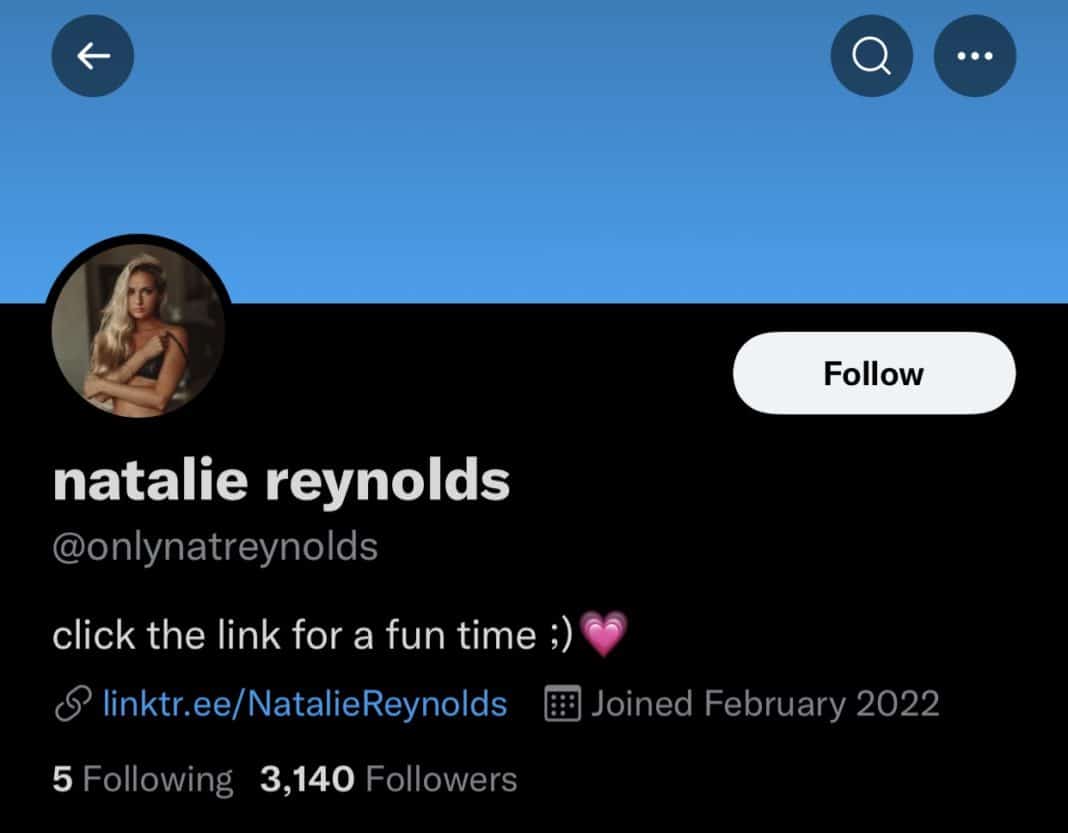Natalie Reynolds OnlyFans Leaked: A Deep Dive into the Controversy
The term "Natalie Reynolds OnlyFans leaked" refers to the unauthorized sharing of explicit content originally posted on the subscription-based platform OnlyFans by Natalie Reynolds, a popular social media influencer and model. In 2023, a significant leak occurred, resulting in the widespread distribution of private photos and videos without Reynolds' consent.
This incident highlights the ongoing debate surrounding online privacy and the vulnerabilities faced by content creators in the digital age. It also raises questions about the ethical and legal implications of sharing leaked content without consent. Historically, similar leaks have sparked discussions about the importance of digital security and the need for platforms like OnlyFans to strengthen their safeguards against unauthorized access.
In this article, we will delve deeper into the Natalie Reynolds OnlyFans leak, examining its significance, analyzing its broader implications, and exploring the ongoing efforts to address the challenges posed by online privacy breaches.
Natalie Reynolds OnlyFans Leaked
The unauthorized sharing of explicit content from Natalie Reynolds' OnlyFans account has sparked a discussion on essential aspects related to online privacy, consent, and the role of platforms in protecting user data. Key points that have emerged include:
- Content Leak: Unauthorized sharing of private content without consent.
- Digital Privacy: Importance of safeguarding personal data and online activities.
- Consent and Autonomy: Respecting individuals' choices and boundaries in sharing personal content.
- Platform Security: Responsibility of platforms to implement robust security measures.
- Legal and Ethical Implications: Consequences and complexities surrounding the sharing of leaked content.
These points underscore the significance of addressing online privacy concerns, particularly in the context of subscription-based platforms like OnlyFans, where users share sensitive content. The Natalie Reynolds OnlyFans leak highlights the need for platforms to prioritize user security and the importance of individuals being mindful of the potential risks associated with sharing personal content online. Furthermore, it raises questions about the ethical and legal boundaries surrounding the distribution of leaked content, emphasizing the need for a nuanced and comprehensive approach to addressing such incidents.
Content Leak
The unauthorized sharing of private content without consent, commonly referred to as a content leak, is a significant issue that has real-world implications, as seen in the case of "Natalie Reynolds OnlyFans Leaked." This incident highlights the connection between content leaks and the broader issue of digital privacy and consent in the digital age.
Cause and Effect: Content leaks can have severe consequences for individuals whose private content is shared without their consent. In the case of Natalie Reynolds, the leak resulted in the widespread distribution of explicit photos and videos, leading to emotional distress, reputational damage, and potential legal ramifications. Content leaks can also lead to cyberbullying, harassment, and other forms of online abuse.
Components: Content leaks are often facilitated by security breaches or unauthorized access to private accounts or platforms. In the case of OnlyFans, the platform's security measures failed to prevent the unauthorized downloading and sharing of Reynolds' content. Content leaks can also occur through phishing scams, malware attacks, or insider leaks.
Examples: The Natalie Reynolds OnlyFans leak is a prominent example of a content leak, but it is far from an isolated incident. Other notable examples include the iCloud leaks of 2014, where private photos of celebrities were leaked online, and the Ashley Madison leak of 2015, where personal information and explicit photos of users of an infidelity website were leaked.
Applications: Understanding the implications of content leaks is essential for individuals, platforms, and policymakers. Individuals need to be aware of the risks associated with sharing personal content online and take steps to protect their privacy. Platforms need to implement robust security measures to prevent unauthorized access to user data. Policymakers need to consider that addresses the unauthorized sharing of private content and provides legal recourse for victims of content leaks.
Content leaks pose significant challenges to digital privacy and consent in the digital age. By raising awareness and understanding of this issue, we can work towards creating a safer online environment where individuals' privacy is respected and protected.
Digital Privacy
The "Natalie Reynolds OnlyFans Leaked" incident serves as a stark reminder of the importance of digital privacy and safeguarding personal data and online activities. This incident highlights how a lack of digital privacy can have severe consequences, not just for public figures like Reynolds, but for individuals from all walks of life.
Cause and Effect: Digital privacy is directly related to the "Natalie Reynolds OnlyFans Leaked" incident. The leak occurred due to a security breach that allowed unauthorized individuals to access and share Reynolds' private content without her consent. This incident demonstrates the direct cause-and-effect relationship between weak digital privacy protections and the potential for sensitive data to be compromised.
Components: Digital privacy is an essential element of the "Natalie Reynolds OnlyFans Leaked" incident. The leak could not have occurred without the lack of adequate digital privacy safeguards in place. This incident underscores the need for robust security measures, encryption protocols, and user education to protect personal data and online activities.
Examples: The "Natalie Reynolds OnlyFans Leaked" incident is just one example of the broader issue of digital privacy breaches. Other notable examples include the Cambridge Analytica scandal, where personal data from millions of Facebook users was harvested without their consent, and the Equifax data breach, where the personal information of over 147 million Americans was compromised.
Applications: Understanding the importance of digital privacy has practical implications for individuals, organizations, and policymakers. Individuals need to be aware of the risks associated with sharing personal data online and take steps to protect their privacy. Organizations need to implement robust security measures to safeguard user data. Policymakers need to consider legislation that protects individuals' digital privacy and holds organizations accountable for data breaches.
Summary: The "Natalie Reynolds OnlyFans Leaked" incident is a wake-up call for individuals, organizations, and policymakers to prioritize digital privacy. By understanding the importance of safeguarding personal data and online activities, we can work towards creating a safer digital environment where individuals' privacy is respected and protected.
Consent and Autonomy
The unauthorized sharing of Natalie Reynolds' OnlyFans content without her consent raises fundamental questions about consent and autonomy in the digital age. Respecting individuals' choices and boundaries in sharing personal content is crucial for protecting privacy and preventing harm.
- Informed Consent:
Consent should be freely given, informed, and specific. In the context of online platforms, users should have clear information about how their content will be used and shared.
- Autonomy and Control:
Individuals have the right to make decisions about their own bodies and personal information. This includes the right to share or withhold explicit content as they see fit.
- Contextual Consent:
Consent is often contextual and may vary depending on the platform, audience, and purpose of sharing. What is considered appropriate in one context may not be appropriate in another.
- Potential Harm:
The unauthorized sharing of personal content can have severe consequences for individuals, including emotional distress, reputational damage, and potential legal ramifications.
These points underscore the importance of respecting consent and autonomy in the digital age. Platforms like OnlyFans have a responsibility to implement robust consent mechanisms and provide users with clear information about how their content will be used and shared. Individuals also have a responsibility to be mindful of the potential risks associated with sharing personal content online and to only share content that they are comfortable with being shared publicly.
Platform Security
The unauthorized sharing of Natalie Reynolds' OnlyFans content underscores the critical role of platform security in protecting user data and privacy. Robust security measures are essential for preventing data breaches and safeguarding sensitive information, as seen in the case of "Natalie Reynolds OnlyFans Leaked."
Cause and Effect: The lack of adequate platform security measures directly contributed to the "Natalie Reynolds OnlyFans Leaked" incident. The platform failed to implement sufficient safeguards to prevent unauthorized access to Reynolds' private content, resulting in the leak. This incident highlights the direct cause-and-effect relationship between weak platform security and the potential for sensitive data to be compromised.
Components: Platform security is an essential element of preventing incidents like "Natalie Reynolds OnlyFans Leaked." Robust security measures, such as encryption protocols, multi-factor authentication, and regular security audits, are crucial for protecting user data. Platforms also need to have clear policies and procedures in place for responding to security breaches and data leaks.
Examples: The "Natalie Reynolds OnlyFans Leaked" incident is just one example of the consequences of inadequate platform security. Other notable examples include the Cambridge Analytica scandal, where personal data from millions of Facebook users was harvested without their consent, and the Equifax data breach, where the personal information of over 147 million Americans was compromised.
Applications: Understanding the importance of platform security has practical implications for platforms, users, and policymakers. Platforms need to invest in robust security measures to protect user data. Users need to be aware of the risks associated with sharing personal information online and take steps to protect their privacy. Policymakers need to consider legislation that holds platforms accountable for data breaches and requires them to implement strong security measures.
Summary: The "Natalie Reynolds OnlyFans Leaked" incident serves as a wake-up call for platforms to prioritize security and take responsibility for protecting user data. Robust platform security measures are essential for safeguarding privacy, preventing data breaches, and maintaining trust between platforms and their users.
Legal and Ethical Implications
The "Natalie Reynolds OnlyFans Leaked" incident has brought to light a multitude of legal and ethical implications surrounding the sharing of leaked content. Understanding these implications is crucial for navigating the complexities and potential consequences associated with such incidents.
Cause and Effect: The sharing of leaked content, as seen in the "Natalie Reynolds OnlyFans Leaked" incident, can have severe legal and ethical consequences. Copyright infringement laws may be violated when copyrighted content is shared without authorization. Additionally, the non-consensual distribution of private and intimate content can lead to charges of invasion of privacy and emotional distress. These legal implications can result in substantial fines, reputational damage, and potential imprisonment.
Components: Legal and ethical implications are integral components of the "Natalie Reynolds OnlyFans Leaked" incident. The incident raises questions about consent, privacy rights, and the boundaries of acceptable online behavior. It also highlights the need for platforms like OnlyFans to implement robust security measures to protect user data and prevent unauthorized access to private content.
Examples: The "Natalie Reynolds OnlyFans Leaked" incident is not an isolated case. Other notable examples include the iCloud leaks of 2014, where private photos of celebrities were leaked online, and the Ashley Madison leak of 2015, where personal information and explicit photos of users of an infidelity website were leaked. These incidents underscore the prevalence of content leaks and the urgent need to address the legal and ethical implications associated with them.
Applications: Understanding the legal and ethical implications of sharing leaked content has practical significance in various applications. For individuals, it is crucial to be aware of the potential legal consequences of sharing leaked content and to respect the privacy rights of others. For platforms like OnlyFans, it is essential to implement robust security measures and clear policies regarding user content to prevent leaks and protect user data. Policymakers may consider enacting legislation to address the non-consensual sharing of private content and provide legal recourse for victims of content leaks.
Summary: The "Natalie Reynolds OnlyFans Leaked" incident serves as a stark reminder of the intricate legal and ethical implications surrounding the sharing of leaked content. Addressing these implications requires a multi-pronged approach involving legal reforms, platform accountability, and individual responsibility. By promoting awareness and understanding of these implications, we can work towards creating a safer online environment where privacy rights are respected and individuals are protected from the harmful consequences of content leaks.
Frequently Asked Questions
This section aims to address common questions and provide clarity on various aspects of the "Natalie Reynolds OnlyFans Leaked" incident.
Question 1:What is the "Natalie Reynolds OnlyFans Leaked" incident?
Answer: The "Natalie Reynolds OnlyFans Leaked" incident refers to the unauthorized sharing of explicit content originally posted by Natalie Reynolds on the subscription-based platform OnlyFans. This incident raises concerns about digital privacy, consent, and the role of platforms in protecting user data.
Question 2:How did the leak occur?
Answer: The exact cause of the leak is still under investigation. However, it is believed that unauthorized individuals gained access to Reynolds' OnlyFans account, downloaded her private content, and subsequently shared it online without her consent.
Question 3:What are the legal implications of sharing leaked content?
Answer: Sharing leaked content without consent may have legal consequences, including copyright infringement and invasion of privacy. Distributing private and intimate content without consent can also lead to charges of emotional distress. Additionally, platforms that fail to implement adequate security measures to protect user data may face legal liability.
Question 4:What should individuals do if they encounter leaked content?
Answer: If you come across leaked content, it is essential to respect the privacy of the individuals involved and refrain from sharing or distributing the content further. You can report the incident to the platform where the content was initially posted and seek support from relevant organizations that address online harassment and privacy violations.
Question 5:What measures can platforms take to prevent future leaks?
Answer: Platforms should prioritize user security by implementing robust security measures, such as multi-factor authentication, encryption protocols, and regular security audits. They should also have clear policies and procedures in place for responding to security breaches and data leaks.
Question 6:What are the broader societal and ethical implications of the "Natalie Reynolds OnlyFans Leaked" incident?
Answer: The incident highlights the need for a broader discussion on digital privacy, consent, and the ethical considerations surrounding the sharing of private content online. It also raises questions about the role of social media platforms in protecting user data and preventing the non-consensual distribution of intimate content.
These FAQs provide a deeper understanding of the "Natalie Reynolds OnlyFans Leaked" incident and its implications. Moving forward, it is crucial to engage in ongoing discussions about digital privacy, consent, and the responsibilities of platforms in safeguarding user data.
Transition to the next section: The next section will delve into the legal and ethical complexities surrounding the sharing of leaked content, exploring the potential consequences for individuals and platforms involved in such incidents.
Tips for Protecting Your Privacy and Content
In the digital age, it is more important than ever to take steps to protect your privacy and the content you share online. Here are some practical tips to help you safeguard your personal information and prevent unauthorized access to your private content:
Tip 1: Use Strong Passwords: Create strong and unique passwords for all your online accounts, avoiding easily guessable combinations. Consider using a password manager to generate and store secure passwords.Tip 2: Enable Two-Factor Authentication: Whenever possible, enable two-factor authentication for your online accounts. This adds an extra layer of security by requiring a second verification code in addition to your password when logging in.Tip 3: Be Mindful of What You Share Online: Think carefully before sharing personal information or sensitive content online. Remember that once you share something online, it can be difficult to control who sees it or how it is used.Tip 4: Use Privacy Settings: Make use of the privacy settings available on social media platforms and online services to control who can see your content and information. Regularly review and adjust your privacy settings to ensure they align with your comfort level.Tip 5: Be Wary of Phishing Scams: Phishing scams attempt to trick you into revealing personal information or clicking on malicious links. Be cautious of unsolicited emails, text messages, or social media posts that ask for your personal information.Tip 6: Keep Software Up to Date: Regularly update your software, including your operating system, browser, and apps. Software updates often include security patches that fix vulnerabilities that could be exploited by attackers.Tip 7: Use a VPN: Consider using a virtual private network (VPN) to encrypt your internet traffic and protect your privacy online. A VPN can be especially useful when using public Wi-Fi networks.By following these tips, you can significantly reduce the risk of your private content being leaked or accessed without your consent. Remember, protecting your privacy and online safety is an ongoing process that requires vigilance and awareness.
In the next section, we will explore the legal and ethical implications of sharing leaked content, examining the potential consequences for individuals and platforms involved in such incidents.
Exposed: The Truth Behind Mini Diva OnlyFans Leaks
Unveiled: The Truth Behind The Mary Burke OnlyFans Leaks
Cierra Mist OnlyFans Leaks: A Cautionary Tale For Content Creators

SCANDAL Who Is NATALIE REYNOLDS VIDEO Leaked & Viral On Twitter

Natalie Reynolds Video Leaked Natalie Reynolds Video Goes Viral on

OnlyFans model wows fans in red lingerie declaring ‘mums can do it too

Natalie Reynolds Twitter Natalie Reynolds Twitter Leaked Videos

Only Fans of XRated Model Natalie Reynolds
ncG1vNJzZmixpaHDrXrApqpsZpSetKrAwKWmnJ2Ro8CxrcKeqmebn6J8r63TmqOinV2nsrq6zqWbrGWfo7m6ecWapaxlnJqurLHDZ5%2BtpZw%3D